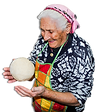SWEET & SPICY
AJVAR LOVE

It is a glorious, late summer morning. The brilliant rays of the sun beam through the branches of the apple tree above us, illuminating the patches of the green grass below. The smoke from the fire makes the misty sunlight swirl as if it were another guest visiting the garden. Marija and her sister-in-law, Ana, are sitting before me on stools washing and cutting the bright, crisp, red peppers in cold fresh water. According to Ana, each village has their own recipe of Ajvar which is passed down from generation to generation. Ajvar is name used to represent a Balkan relish which is used as a condiment on bread, meats, and fish...practically anything savory. During the late summer and early fall, Ajvar is made in a large quantities to last the cold winter months. Ajvar takes a whole day to make!! In the olden days, making Avjar was a social event. Women in the villages would gather together over a communal fire, taking turns preparing and stirring the savory relish. Most families use over 40 kilos worth of this pepper relish to last the whole winter, but Ana is making only 20 kilos as her family is smaller. The Avjar Recipe we are making today is made primarily with large, sweet red chili peppers, eggplant, vinegar, and an assortment of other spices.







The promise of warmth lures me into the outdoor cooking house which is adjacent to the garden, where the fire is stoking in preparation for the ajvar. A white enamel, cast-iron stove sits opposite the entrance. A tall, handmade, and wooden ladder worn smooth with decades of use leans against the cement wall. As, custom dictates, a cast iron peka hangs ever ready above the charred, red brick outline of the century-old, traditional fireplace. Onions tethered by their fibrous hollow stems hang from the ceiling, and yellow bags filled with potatoes line the floors.


I walk back under the apple tree and sit alongside Marija and Ana, who have finished cutting the peppers and are now deftly skinning the eggplants. They are talking together in rapid Croatian, God only knows what they are saying, but the head nodding and soft tones make me believe it is village gossip. Since I do not speak Croatian and since they speak very few words of English, I only watch and listen to sounds. I have learned that not being able to speak the same language as the community you are living with affords you a type of freedom and acceptance. Freeing; because there is no burden to explain myself or create conversation in moments of silence. Acceptance, because I pose no threat of judgement or criticism and therefore am granted access to a private, personal world. I feel like a hovering ghost.
Ana leaves and returns bearing a voluminous, dented, and aluminum pot containing all of the necessary ingredients for the Ajvar: garlic, vinegar, peppercorns, salt, sugar, and bay leaves. She calls my attention to the ingredients and begins to add a pinch of this and a dash of that to the pot. I try to snap away with my camera and take everything in at the same time. After adding all of the ingredients, Ana walks over to the kitchen house where she places the pot upon the flame. Ana faces me and closes her hands into tight fists, she points to the vinegar and spices concoction and then quickly opens her fingers and repeats the motion saying "pop, pop, pop!” She then points to her wrist...We have to wait until the liquid begins to boil before we add the peppers. I laugh at how simple and sweet her instructions are and how easy it is to communicate with only your hands!

Back under the apple tree, we sit and wait for the concoction to boil. I hear the tinkling of coffee cups and look up to see Ana’s daughter-in-law with a tray of cookies and strong Turkish coffee. Anthony returns from the Farmer’s Market just in time for the boiling of peppers. We boil the peppers and eggplants, grind them, and add them to a sizzling oil to brew for hours. Ana's husband, Luka, is excited at the introduction of another man, and takes the opportunity to show Anthony his hunting gear and trophies. Marija pulls us away from the boar hunting chronicles, to bring us to her friend, Maritsa, who will be teaching us how to bake Croatian Bread under a Peka. Ana agrees to stir the Ajvar while we are gone.
We return a few hours later just in time to taste and jar the ajvar. The taste of the ajvar reminds me of the country of Croatia, sweet and spicy. Upon leaving, Ana hands us a plate of ajvar in the shape of a heart. We share the Ajvar, Made with Love.



Ajvar is a tradition that is found throughout the Balkans. For another interesting personal experience, perspective and recipe for Ajvar you can read a post from our friend Aida from the Balkan Lunch Box!
Written by Leila Elamine and Anthony Morano




